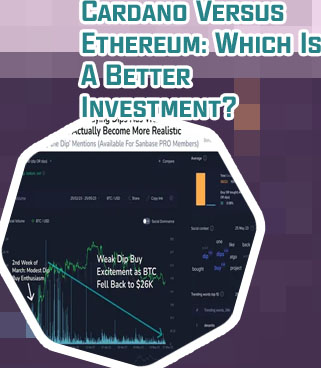Cardano vs ethereum
When it comes to comparing Cardano and Ethereum, there are several key factors to consider. From scalability and security to governance and smart contract functionality, each blockchain platform offers unique strengths and weaknesses. To help you navigate this complex topic, here are four articles that delve into the differences between Cardano and Ethereum, providing insights into which platform may be the better choice for your needs.
The Battle of Consensus Algorithms: Cardano vs Ethereum

Today, we have the pleasure of diving into the world of blockchain technology and exploring the fierce competition between two major players: Cardano and Ethereum. Both of these platforms utilize consensus algorithms to validate transactions and secure their networks, but they have chosen different paths to achieve this goal.
Cardano, with its innovative Ouroboros protocol, takes a scientific approach to consensus. By utilizing a proof-of-stake algorithm based on peer-reviewed research, Cardano ensures that its network remains secure and decentralized. On the other hand, Ethereum relies on the tried and tested proof-of-work algorithm, similar to Bitcoin. While this has proven to be effective, it comes with high energy consumption and scalability issues.
One of the key differences between Cardano and Ethereum lies in their governance models. Cardano has a more decentralized approach, allowing stakeholders to vote on protocol changes and upgrades. In contrast, Ethereum is in the process of transitioning to a proof-of-stake model with Ethereum 2.0, which aims to address scalability and energy efficiency concerns.
In conclusion, the battle between Cardano and Ethereum is not just about technology, but also about ideology. Both platforms are striving to create a decentralized and secure ecosystem, but they are taking different paths to achieve this goal. It will be fascinating to see
Smart Contract Showdown: A Comparison of Cardano and Ethereum
In the world of blockchain technology, Cardano and Ethereum are two prominent platforms that have gained significant attention for their smart contract capabilities. Both platforms offer unique features and advantages, making them popular choices for developers looking to create decentralized applications (dApps).
Cardano, founded by Charles Hoskinson, takes a scientific approach to blockchain technology, focusing on security and scalability. The platform uses a proof-of-stake consensus algorithm, which allows for faster transaction speeds and lower energy consumption compared to Ethereum's proof-of-work algorithm. Cardano also boasts a robust governance system, allowing stakeholders to vote on proposed changes to the network.
On the other hand, Ethereum, created by Vitalik Buterin, is the most widely used blockchain platform for smart contracts and dApps. Ethereum's programming language, Solidity, is widely adopted by developers, making it easier to build and deploy smart contracts. However, Ethereum has been facing scalability issues, resulting in high gas fees and slower transaction speeds.
In conclusion, both Cardano and Ethereum have their strengths and weaknesses when it comes to smart contracts. While Ethereum has a more established ecosystem and developer community, Cardano offers a more secure and scalable platform. Ultimately, the choice between the two platforms will depend on the specific needs of the project at hand.
Scalability Wars: Can Cardano Surpass Ethereum?
Cardano and Ethereum are two major players in the world of blockchain technology, with both platforms aiming to revolutionize the way we transact and interact online. One of the key factors that sets them apart is their scalability, or the ability to handle a large number of transactions quickly and efficiently.
Ethereum, the brainchild of Vitalik Buterin, has long been considered the gold standard in terms of scalability. However, as the platform has grown in popularity, it has faced challenges in scaling to meet the demands of its users. This has led to high transaction fees and slow processing times, which has prompted developers to seek out alternative solutions.
Enter Cardano, a newer player in the blockchain space that has positioned itself as a scalable and sustainable alternative to Ethereum. Founded by Charles Hoskinson, one of the co-founders of Ethereum, Cardano utilizes a unique proof-of-stake algorithm that allows for faster transactions and lower fees. This has made it an attractive option for developers looking to build decentralized applications that can scale to meet the demands of a global user base.
While Ethereum currently boasts a larger market cap and user base, Cardano's focus on scalability and sustainability has positioned it as a strong contender in the ongoing "scalability wars." As the two platforms continue to evolve
Governance Models: Decentralization on Cardano vs Ethereum
Governance models play a crucial role in the success and sustainability of blockchain platforms. Decentralization is a key aspect that sets apart different blockchain projects, and two prominent players in the space are Cardano and Ethereum. Both platforms have their own unique approach to governance and decentralization, which ultimately impacts their ability to scale, innovate, and adapt to changing market conditions.
Cardano, known for its rigorous academic approach, has a strong focus on research and peer-reviewed development. This is reflected in its governance model, which aims to achieve high levels of decentralization through a multi-layered approach involving stakeholders, developers, and the community. The platform's use of a proof-of-stake consensus mechanism, along with its emphasis on sustainability and scalability, sets it apart as a viable alternative to Ethereum.
On the other hand, Ethereum has a more established governance model that has evolved over time. While Ethereum has a large and active developer community, its governance structure has faced challenges in the past, particularly around decision-making and protocol upgrades. Despite these challenges, Ethereum remains a dominant force in the blockchain space, with a strong network effect and widespread adoption.
